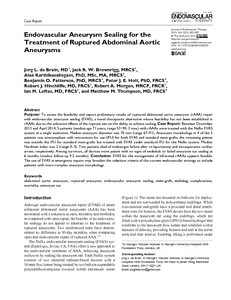de Bruin, JL; Brownrigg, JR; Karthikesalingam, A; Patterson, BO; Holt, PJ; Hinchliffe, RJ; Morgan, RA; Loftus, IM; Thompson, MM
(2015)
Endovascular aneurysm sealing for the treatment of ruptured abdominal aortic aneurysms.
Journal of Endovascular Therapy, 22 (3).
pp. 283-287.
ISSN 1545-1550
https://doi.org/10.1177/1526602815582529
SGUL Authors: Holt, Peter James Edward Thompson, Matthew Merfyn
![[img]](https://openaccess.sgul.ac.uk/107417/1.hassmallThumbnailVersion/Endovascular%20aneurysm%20sealing%20for%20the%20treatment%20of%20ruptured%20abdominal%20aortic%20aneurysms..pdf)  Preview |
|
["document_typename_cannot open `/data/SGUL/sgul/eprints3/archives/sgul/documents/disk0/00/10/74/17/01/Endovascular' (No such file or directory)
cannot open `aneurysm' (No such file or directory)
cannot open `sealing' (No such file or directory)
cannot open `for' (No such fi" not defined]
Published Version
Available under License Creative Commons Attribution Non-commercial.
Download (637kB)
| Preview
|
Abstract
PURPOSE: To assess the feasibility and report preliminary results of ruptured abdominal aortic aneurysm (rAAA) repair with endovascular aneurysm sealing (EVAS), a novel therapeutic alternative whose feasibility has not been established in rAAAs due to the unknown effects of the rupture site on the ability to achieve sealing. CASE REPORT: Between December 2013 and April 2014, 5 patients (median age 71 years, range 57-90; 3 men) with rAAAs were treated with the Nellix EVAS system at a single institution. Median aneurysm diameter was 70 mm (range 67-91). Aneurysm morphology in 4 of the 5 patients was noncompliant with instructions for use (IFU) for both EVAS and standard stent-grafts; the remaining patient was outside the IFU for standard stent-grafts but treated with EVAS under standard IFU for the Nellix system. Median Hardman index was 2 (range 0-3). Two patients died of multiorgan failure after re-laparotomy and intraoperative cardiac arrest, respectively. Among survivors, all devices were patent with no signs of endoleak or failed aneurysm sac sealing at 6 months (median follow-up 9.2 months). CONCLUSION: EVAS for the management of infrarenal rAAAs appears feasible. The use of EVAS in emergency repairs may broaden the selection criteria of the current endovascular strategy to include patients with more complex aneurysm morphology.
| Item Type: |
Article
|
| Additional Information: |
© The Author (s) 2015. This article is distributed under the terms of the Creative Commons Attribution-NonCommercial 3.0 License (http://www.creativecommons.org/licenses/by-nc/3.0/) which permits non-commercial use, reproduction and distribution of the work without further permission provided the original work is attributed as specified on the SAGE and Open Access page (http://www.uk.sagepub.com/aboutus/openaccess.htm). |
| Keywords: |
abdominal aortic aneurysm, aneurysm sac, complications, endobag, endovascular aneurysm sealing, mortality, ruptured aneurysm, stent-graft, abdominal aortic aneurysm, ruptured aneurysm, endovascular aneurysm sealing, stent-graft, endobag, complications, mortality, aneurysm sac, Cardiovascular System & Hematology, 1103 Clinical Sciences |
| SGUL Research Institute / Research Centre: |
Academic Structure > Molecular and Clinical Sciences Research Institute (MCS)
Academic Structure > Molecular and Clinical Sciences Research Institute (MCS) > Vascular & Cardiac Surgery (INCCVC) |
| Journal or Publication Title: |
Journal of Endovascular Therapy |
| ISSN: |
1545-1550 |
| Language: |
eng |
| Publisher License: |
Creative Commons: Attribution-Noncommercial 3.0 |
| Projects: |
|
| PubMed ID: |
25904491 |
| Web of Science ID: |
WOS:000354868700001 |
| Dates: |
| Date |
Event |
| 2015-06-01 |
Published |
|
 |
Go to PubMed abstract |
| URI: |
https://openaccess.sgul.ac.uk/id/eprint/107417 |
| Publisher's version: |
https://doi.org/10.1177/1526602815582529 |
Statistics
Item downloaded times since 13 May 2016.
Actions (login required)
 |
Edit Item |



